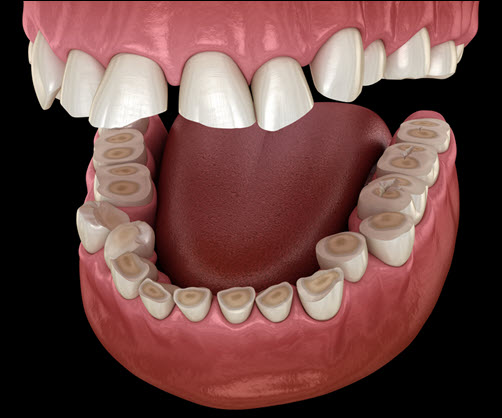Bruxism causes teeth grinding and jaw clenching, often during sleep. Stress, anxiety, misaligned teeth, and sleep disorders increase the risk of bruxism. Grinding places pressure on teeth and jaw muscles, leading to enamel erosion and tooth sensitivity. Chronic bruxism causes jaw pain, headaches, and tooth fractures. Left untreated, it damages tooth alignment and weakens the temporomandibular joint (TMJ). Managing bruxism early prevents dental complications and improves jaw comfort. Wearing a night guard and reducing stress reduce grinding frequency. Understanding the symptoms and causes of bruxism helps prevent long-term damage. Let’s explore how to identify and prevent bruxism for better oral health.
Common Symptoms of Bruxism
 Bruxism often causes jaw pain, headaches, and tooth sensitivity. Waking up with sore jaw muscles signals nighttime grinding. Increased tooth sensitivity to hot and cold foods reflects enamel erosion. Clicking or popping sounds when opening the mouth suggest TMJ strain. Fractured, chipped, or flattened teeth result from grinding pressure. Facial pain and earaches occur from jaw muscle strain. Teeth grinding during sleep often causes noise that disturbs sleep partners. Jaw stiffness and limited range of motion reflect joint strain. Untreated bruxism increases the risk of gum recession and tooth loosening. Early detection of symptoms improves treatment success and comfort. Managing grinding early prevents long-term dental damage and jaw strain.
Bruxism often causes jaw pain, headaches, and tooth sensitivity. Waking up with sore jaw muscles signals nighttime grinding. Increased tooth sensitivity to hot and cold foods reflects enamel erosion. Clicking or popping sounds when opening the mouth suggest TMJ strain. Fractured, chipped, or flattened teeth result from grinding pressure. Facial pain and earaches occur from jaw muscle strain. Teeth grinding during sleep often causes noise that disturbs sleep partners. Jaw stiffness and limited range of motion reflect joint strain. Untreated bruxism increases the risk of gum recession and tooth loosening. Early detection of symptoms improves treatment success and comfort. Managing grinding early prevents long-term dental damage and jaw strain.
Causes of Bruxism
Stress and anxiety increase muscle tension and grinding frequency. Misaligned teeth and bite problems create uneven pressure, triggering grinding. Sleep disorders like sleep apnea and snoring increase jaw muscle activity. Caffeine and alcohol consumption before bed increase nighttime grinding. Certain medications, including antidepressants, list bruxism as a side effect. Poor sleep posture increases jaw tension and clenching. Smoking and recreational drug use worsen muscle strain and jaw tension. Genetics also play a role in bruxism risk and severity. Identifying the cause of bruxism improves treatment success. Managing stress and improving sleep quality reduce grinding and jaw strain.
How Bruxism Affects Dental Health
Grinding wears down enamel, increasing tooth sensitivity and decay risk. Flattened and chipped teeth result from constant grinding pressure. Severe grinding exposes dentin, increasing sensitivity to hot, cold, and sweet foods. Weakened enamel increases the risk of cavities and fractures. Jaw strain causes misalignment and increases pressure on the TMJ. Untreated bruxism increases gum recession and weakens tooth attachment. Chronic grinding reduces tooth height and alters facial structure. Tooth fractures and damage require fillings, crowns, or veneers for repair. Jaw pain and stiffness reduce chewing comfort and speaking clarity. Managing bruxism early protects teeth and jaw alignment.
Preventing Bruxism with a Night Guard
Wearing a custom-fitted night guard reduces grinding pressure on teeth. The night guard creates a protective barrier between upper and lower teeth. It absorbs grinding force and reduces enamel wear. Custom night guards fit comfortably and improve jaw alignment. Dentists recommend night guards for patients with chronic bruxism and jaw strain. Wearing a night guard reduces TMJ strain and improves sleep quality. Professional fitting ensures proper bite alignment and comfort. Regular cleaning and replacement maintain guard strength and effectiveness. Using a night guard increases tooth protection and reduces jaw discomfort. Stronger teeth and improved alignment increase overall dental comfort.
Managing Stress to Reduce Grinding
Stress increases muscle tension and grinding frequency. Relaxation techniques like deep breathing, yoga, and meditation reduce muscle activity. Exercise releases endorphins and reduces overall stress levels. Better sleep quality reduces nighttime grinding and jaw tension. Reducing caffeine and alcohol intake lowers muscle activity before sleep. Managing work and personal stress improves muscle relaxation and jaw comfort. Cognitive behavioral therapy (CBT) helps patients identify and reduce stress triggers. Massage therapy relaxes jaw muscles and reduces clenching. Improved stress management reduces bruxism symptoms and improves sleep quality. Lower stress levels improve overall dental and emotional health.
Correcting Bite Alignment to Prevent Bruxism
Misaligned teeth create uneven pressure, increasing grinding risk. Orthodontic treatment with braces or aligners corrects bite issues. Proper bite alignment reduces jaw strain and muscle tension. Dental crowns and veneers restore proper tooth height and alignment. Dentists adjust high points on teeth to create a balanced bite. Orthodontic correction reduces uneven pressure and grinding frequency. Correcting misalignment improves chewing strength and jaw comfort. Balanced bite alignment reduces TMJ strain and tooth sensitivity. Early orthodontic treatment prevents long-term dental damage. Improved bite strength increases chewing comfort and overall dental health.
Strengthening Teeth and Jaw Health
Fluoride treatments strengthen enamel and reduce sensitivity. Brushing with fluoride toothpaste protects enamel from grinding damage. Mouth exercises strengthen jaw muscles and improve joint flexibility. Avoiding hard foods and chewing gum reduces jaw strain. Regular dental checkups detect early signs of grinding damage. Dentists recommend dental bonding or crowns to repair worn teeth. Professional cleanings remove plaque and protect enamel strength. Strengthening enamel increases resistance to grinding pressure. Better jaw alignment reduces joint strain and improves bite balance. Stronger teeth and better joint health reduce long-term bruxism complications.
Bruxism causes tooth sensitivity, jaw pain, and enamel damage. Stress, misaligned teeth, and poor sleep increase grinding risk. Worn enamel increases cavity risk and reduces tooth strength. Wearing a night guard protects teeth and reduces jaw strain. Managing stress and correcting bite alignment prevent bruxism symptoms. Strengthening enamel and jaw muscles reduces grinding damage and improves comfort. Early treatment prevents severe dental damage and improves bite strength. Investing in bruxism prevention protects teeth and increases long-term dental health. Stronger teeth and better jaw alignment create a more comfortable and confident smile.

